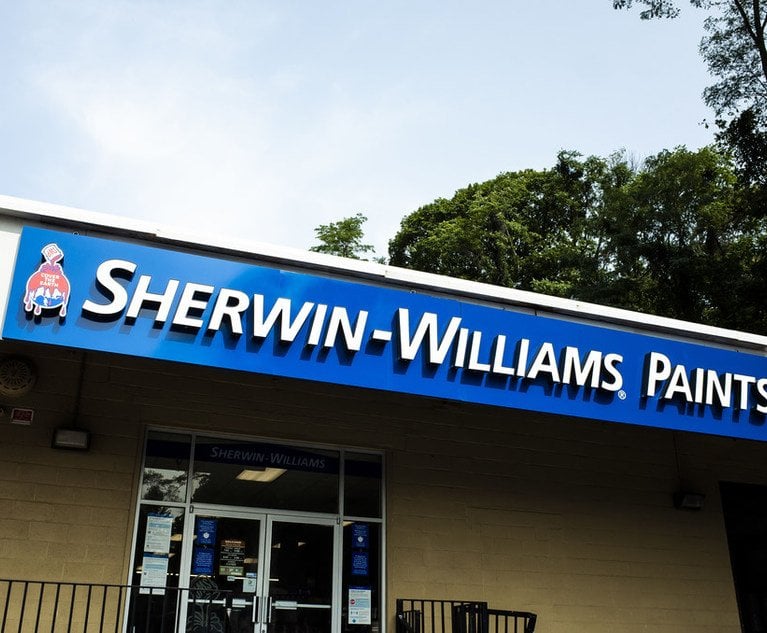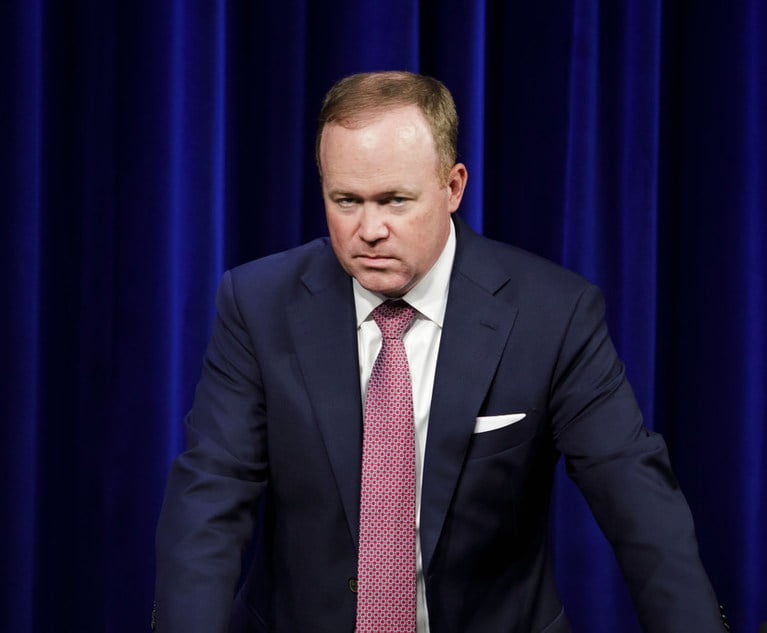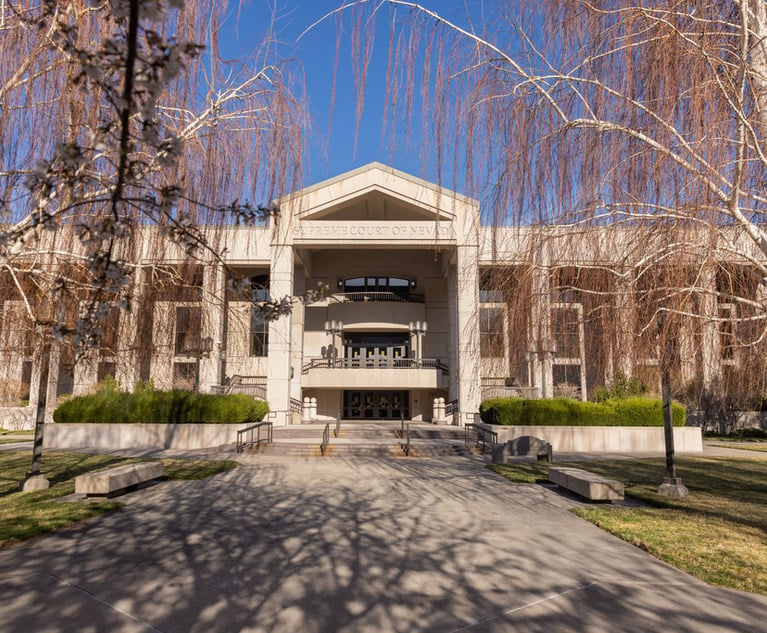NLRB Wasn't Out of Line Applying New Standard Only to Future Cases
An employee loses her argument, in the Ninth Circuit, that the NLRB's new, less deferential standard for arbitral decisions should have applied to her pending dispute.
October 17, 2017 at 06:50 PM
2 minute read

The National Labor Relations Board was not required to retroactively apply a new standard to a pending dispute over an arbitral decision, a federal appeals court ruled Tuesday in turning down an employee's challenge to her termination.
The U.S. Court of Appeals for the Ninth Circuit supported the NLRB's prospective application of a new, less deferential standard for determining when the panel should accept an arbitration decision. The employee, a forklift operator named Coletta Beneli, argued the new standard should apply in her case.
Beneli was fired from Babcock & Wilcox Construction Co. Inc. two months after she was hired. A grievance review committee, through binding arbitration, upheld her termination.
The federal labor board's usual practice is to apply new policies and standards in all pending cases, at whatever stage, the Ninth Circuit said. In Beneli's case, the NLRB adopted a new standard for arbitral agreements but Beneli's complaint was analyzed under the older, more deferential standard. The board ultimately deferred to the arbitral decision, and Beneli lost her challenge to her firing.
The appeals court, executing a balancing test, concluded it was lawful for the NLRB's new policy—which is less deferential to arbitral decisions—to apply only prospectively. The old standard had been in place for nearly 60 years.
“Courts of appeals throughout the country, including this one, repeatedly upheld that standard. Thus, the new standard represents an abrupt departure from well-established practice,” the Ninth Circuit said Tuesday.
The new standard shifts the burden of proof and makes deferral to an arbitral decision less likely, the appeals court said. This view was applied only to future cases, but not in Beneli's case, because of its potential impact on “settled expectations of employers and unions, who had bargained for dispute resolution mechanisms under the old NLRB standard,” the appeals court said.
This content has been archived. It is available through our partners, LexisNexis® and Bloomberg Law.
To view this content, please continue to their sites.
Not a Lexis Subscriber?
Subscribe Now
Not a Bloomberg Law Subscriber?
Subscribe Now
NOT FOR REPRINT
© 2025 ALM Global, LLC, All Rights Reserved. Request academic re-use from www.copyright.com. All other uses, submit a request to [email protected]. For more information visit Asset & Logo Licensing.
You Might Like
View All
Insurers Dodge Sherwin-Williams' Claim for $102M Lead Paint Abatement Payment, State High Court Rules

What Does Ohio Supreme Court's Opioid Decision Mean for Public Nuisance Claims?
6 minute read
Judge's Civil Contempt Order for Zoom Recording Violation Must Include 'The Keys to the Cell,' State Appellate Court Says
4 minute read
Nevada Supreme Court to Decide Fate of Groundbreaking Contingency Cap Ballot Measure
5 minute readTrending Stories
- 1You Too Can Be a Programmer: Connecting to Legal Platform APIs With Generative AI (Part 2)
- 2Court of Appeals and Appellate Division As Courts of First Instance
- 3Federal Judge Slaps Down the SEC’s Attempt to Regulate Crypto Liquidity Providers
- 4A Client Is Guilty; But Another Man Is Wrongfully Convicted
- 5Legal Tech's Predictions for Cybersecurity in 2025
Who Got The Work
Michael G. Bongiorno, Andrew Scott Dulberg and Elizabeth E. Driscoll from Wilmer Cutler Pickering Hale and Dorr have stepped in to represent Symbotic Inc., an A.I.-enabled technology platform that focuses on increasing supply chain efficiency, and other defendants in a pending shareholder derivative lawsuit. The case, filed Oct. 2 in Massachusetts District Court by the Brown Law Firm on behalf of Stephen Austen, accuses certain officers and directors of misleading investors in regard to Symbotic's potential for margin growth by failing to disclose that the company was not equipped to timely deploy its systems or manage expenses through project delays. The case, assigned to U.S. District Judge Nathaniel M. Gorton, is 1:24-cv-12522, Austen v. Cohen et al.
Who Got The Work
Edmund Polubinski and Marie Killmond of Davis Polk & Wardwell have entered appearances for data platform software development company MongoDB and other defendants in a pending shareholder derivative lawsuit. The action, filed Oct. 7 in New York Southern District Court by the Brown Law Firm, accuses the company's directors and/or officers of falsely expressing confidence in the company’s restructuring of its sales incentive plan and downplaying the severity of decreases in its upfront commitments. The case is 1:24-cv-07594, Roy v. Ittycheria et al.
Who Got The Work
Amy O. Bruchs and Kurt F. Ellison of Michael Best & Friedrich have entered appearances for Epic Systems Corp. in a pending employment discrimination lawsuit. The suit was filed Sept. 7 in Wisconsin Western District Court by Levine Eisberner LLC and Siri & Glimstad on behalf of a project manager who claims that he was wrongfully terminated after applying for a religious exemption to the defendant's COVID-19 vaccine mandate. The case, assigned to U.S. Magistrate Judge Anita Marie Boor, is 3:24-cv-00630, Secker, Nathan v. Epic Systems Corporation.
Who Got The Work
David X. Sullivan, Thomas J. Finn and Gregory A. Hall from McCarter & English have entered appearances for Sunrun Installation Services in a pending civil rights lawsuit. The complaint was filed Sept. 4 in Connecticut District Court by attorney Robert M. Berke on behalf of former employee George Edward Steins, who was arrested and charged with employing an unregistered home improvement salesperson. The complaint alleges that had Sunrun informed the Connecticut Department of Consumer Protection that the plaintiff's employment had ended in 2017 and that he no longer held Sunrun's home improvement contractor license, he would not have been hit with charges, which were dismissed in May 2024. The case, assigned to U.S. District Judge Jeffrey A. Meyer, is 3:24-cv-01423, Steins v. Sunrun, Inc. et al.
Who Got The Work
Greenberg Traurig shareholder Joshua L. Raskin has entered an appearance for boohoo.com UK Ltd. in a pending patent infringement lawsuit. The suit, filed Sept. 3 in Texas Eastern District Court by Rozier Hardt McDonough on behalf of Alto Dynamics, asserts five patents related to an online shopping platform. The case, assigned to U.S. District Judge Rodney Gilstrap, is 2:24-cv-00719, Alto Dynamics, LLC v. boohoo.com UK Limited.
Featured Firms
Law Offices of Gary Martin Hays & Associates, P.C.
(470) 294-1674
Law Offices of Mark E. Salomone
(857) 444-6468
Smith & Hassler
(713) 739-1250






